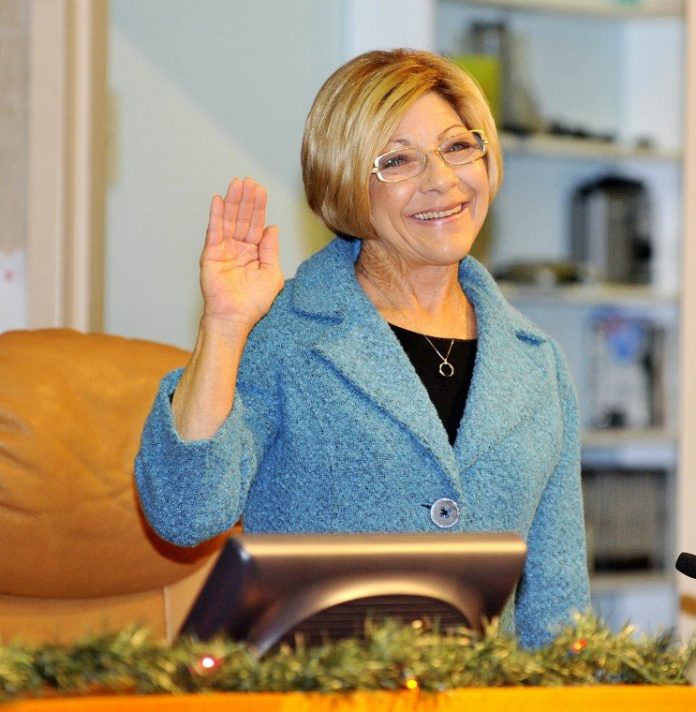In the face of outspoken public resistance, Gilroy City Council voted Monday night to keep the regular Council meeting start time at 6 p.m., instead of moving it to 7 p.m.
In a highly charged atmosphere following five comments by members of the public, Mayor Pro Tempore Perry Woodward proposed that the Council take no action.
Seconded by Councilman Dion Bracco, the vote passed 4-2 with Councilman Peter Arellano absent.
Councilwoman Cat Tucker and Councilman Peter Leroe-Muñoz cast the dissenting votes.
Janet Espersen of the Save Our Gilroy Foothills Group opened the public comments and was adamant that the time needed to be changed. She questioned whether the Council members are a “group who make decisions based on convenience?”
The Save Our Gilroy Foothills Group are the main proponents behind the time change vote that made it onto the agenda for Monday’s Council meeting. At the Feb. 4 meeting, Tom Espersen and Janet Espersen – co-chairs of group – requested that the Council consider a later start time for Council meetings.
The rationale behind the request is simple: Of the 15 cities in Santa Clara County, only three including Gilroy have regular City Council meetings that commence at 6 p.m. And while the City of San Jose holds Council Meetings at 1:30 p.m., it also allows special meetings to take place at 7:30 p.m.
“Is it the other communities who are out of step with Gilroy, or is Gilroy out of step with other communities in Santa Clara County?” he wondered.
Janet Espersen pointed to online polls conducted by the Gilroy Dispatch. The first poll taken in November 2011 demonstrated that 73 percent of responders wanted the Council meeting time moved to 7 p.m. A second poll ending on Feb. 13, 2013 showed that 70 percent of responders were still in favor of a time change.
Woodward was unimpressed by the facts and figures offered by Espersen.
“The Dispatch polls? That tells you what a community wants? Council member Tucker and I wouldn’t be here if the Dispatch polls were accurate,” said Woodward, referring to a poll taken during the 2007 City Council election, in which incumbent Russ Valiquette was unseated by Woodward.
Tom Espersen also drew attention to the changing demographics of Gilroy and the need for the City Council to recognize the demands that modern life places upon people.
“Gilroy just isn’t filled with high-paying jobs, you must commute,” he said, referring to citizens who work in Silicon Valley and live in Gilroy. He went further by challenging the Council to better serve the electorate.
“The City staff is salaried, you have to be here. Your first loyalty must be to the people of Gilroy,” he remarked.
Speaking to the needs of the electorate, Councilman Peter Leroe-Muñoz agreed with the need for a change in the Council meeting time.
“It’s difficult for citizens to be active in the meetings,” he said, citing the impracticality of taking off from work early and dealing with rush hour.
Furthermore, Leroe-Muñoz sees citizen input as mutually beneficial to Council and the residents of Gilroy, overriding concerns about the “inconvenience of staying later at a meeting.”
As the impassioned pleas for the time change continued, Mayor Don Gage sought to offer an olive branch of compromise to the citizens – suggesting that the meeting time be moved to 6:30 p.m. – while floating the idea that important business could be listed as “time certain.”
“We could do our closed business first, which would allow the public to arrive on time,” he remarked.
Community member Bill Scheid, who spoke during public comment, pointed to the reality of combining today’s workplace with a desire to perform his civic duty as a citizen.
“I may have to go to bed and hour later than I would like to, but I don’t want anyone to have the excuse that ‘(the public) couldn’t get there on time,” he said.
Mayor Gage and Councilman Bracco pointed to the fact that a later start time would mean later finishes, and the possibility of bad decisions being made late at night.
“It’s our job to thoroughly hash things out,” commented Gage.
Bracco says changing the meeting time to 7 p.m. will have serious consequences for future Council business.
“Some of the worst decisions that have been made on councils I’ve been on were made after midnight,” he observed.
On top of cloudy thinking in the wee hours of the morning, Bracco also thinks a later start time will push out members of the community the Council is seeking to engage.
“Changing it to 6 p.m. allowed us to bring families and kids into the legislative process,” he commented.However, Councilwoman Cat Tucker agreed with the idea of changing the time to 7 p.m. She also pointed out: there is a way to avoid City Council meetings that go late into the evening.
“We have a rule that allows to add another Wednesday if we have to,” she noted.
However, the idea of splitting meetings up and dragging them out through the week doesn’t sit well with Gage.
“This just means that meetings will become increasingly longer,” he said.
In the same breath, he also dismissed the idea of gazing longingly the meeting times adopted by other cities in Santa Clara County.
“We’ve had some hellacious meetings that started at 7 p.m.,” he stated.















